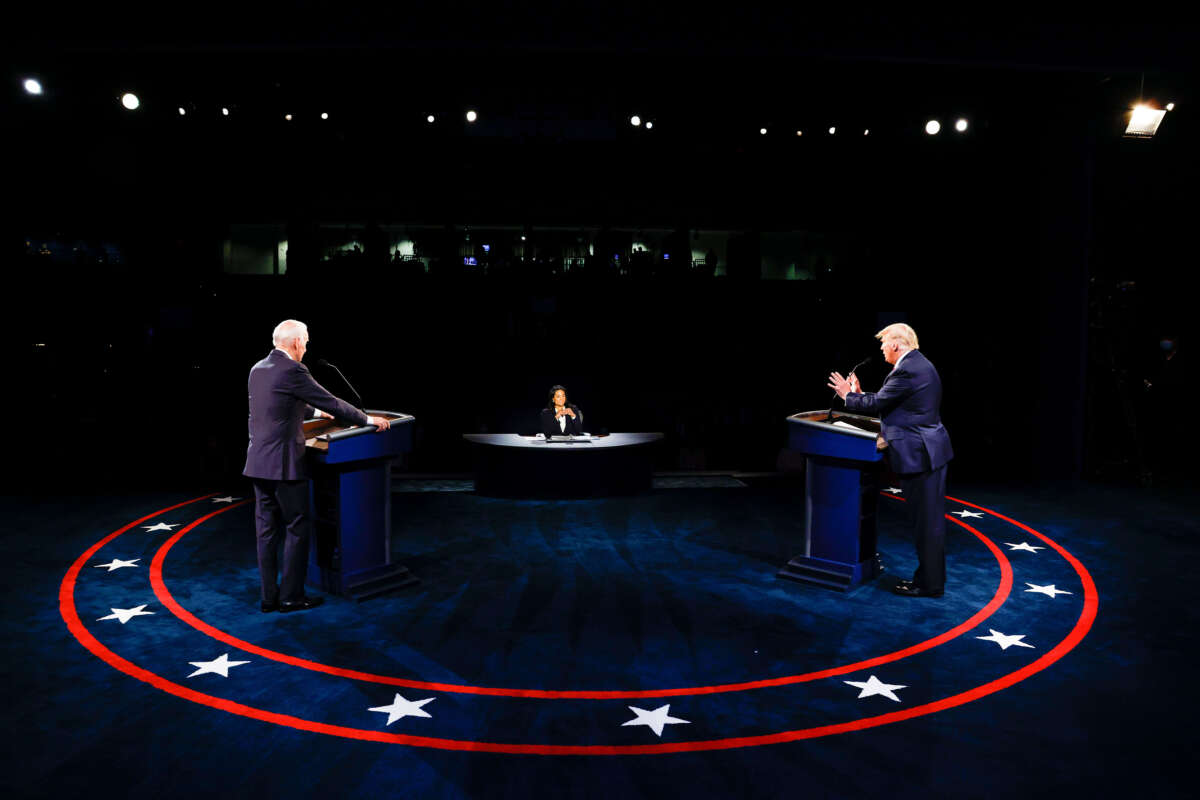Did you know that Truthout is a nonprofit and independently funded by readers like you? If you value what we do, please support our work with a donation.
On Wednesday morning, President Joe Biden announced that he wants to debate former President Donald Trump twice before early voting begins in the 2024 election.
Hours later, the two campaigns came to an agreement on two dates.
Biden’s proposal removes the Commission on Presidential Debates, which has coordinated debates between candidates for decades, from the rulemaking process. In a letter to the commission, the Biden campaign stated plainly that “he will not” participate in their planned debate structure.
Instead, the two campaigns will coordinate directly with each other, coming up with agreed-upon rules and dates for two debates. The Biden campaign suggested one debate take place as early as June, and the other in September, just before early voting begins in the presidential contest.
A third debate between vice presidential candidates would happen in July, according to Biden’s proposal, after the Republican National Convention.
Following the announcement from Biden, the two campaigns announced they would hold the first debate on June 27, airing on CNN at 9 p.m. Eastern Time. The debate will take place in Atlanta, Georgia, with no audience.
The campaigns also announced a second date for a debate to take place on September 10. It will be hosted by ABC News, with more details to come.
Biden reportedly wants the debates to take place inside television studios without audiences, removing the possibility of raucous supporters on both sides from disrupting the back-and-forth. He also called for a system to be in place that would shut microphones off automatically if a candidate goes over the allotted time for a response — a disadvantage for Trump, who frequently interrupts his opponents in debates and rambles on in his own answers.
In a video message directed toward the GOP nominee, Biden struck an adversarial (and at times, mocking) tone with his opponent.
“Donald Trump lost two debates to me in 2020, and since then he hasn’t shown up for a debate,” Biden said, referring to Trump’s refusal to debate other Republicans during the primaries. “Now he’s acting like he wants to debate me again. Well, make my day, pal.”
“Let’s pick the dates, Donald. I hear you’re free on Wednesdays,” Biden added, alluding to Trump’s current schedule in which he’s sitting in a trial in New York City four days out of the week.
Trump responded to Biden’s call for debates, stating in a Truth Social message that he was “Ready and Willing to Debate” the Democratic nominee in those two months. He also called for more than two debates, and said he wanted a “very large venue” for the debates to happen in, accusing Biden of being “afraid of crowds.”
“Just tell me when, I’ll be there,” Trump added.
Biden’s position on debating Trump has shifted over the past few months. In March, the president said his participation in a debate would depend on what Trump’s “behavior” was like. However, in late April, Biden said he would be “happy to debate” Trump.
Biden, who is slightly behind Trump in the polls, may have determined that a debate may help him recover voters.
Polling from 2020 shows that Biden “won” the debates against Trump, as his favorability ratings went up slightly after the first debate and voters said he had bested Trump in their second one.
A terrifying moment. We appeal for your support.
In the last weeks, we have witnessed an authoritarian assault on communities in Minnesota and across the nation.
The need for truthful, grassroots reporting is urgent at this cataclysmic historical moment. Yet, Trump-aligned billionaires and other allies have taken over many legacy media outlets — the culmination of a decades-long campaign to place control of the narrative into the hands of the political right.
We refuse to let Trump’s blatant propaganda machine go unchecked. Untethered to corporate ownership or advertisers, Truthout remains fearless in our reporting and our determination to use journalism as a tool for justice.
But we need your help just to fund our basic expenses. Over 80 percent of Truthout’s funding comes from small individual donations from our community of readers, and over a third of our total budget is supported by recurring monthly donors.
Truthout has launched a fundraiser to add 340 new monthly donors in the next 5 days. Whether you can make a small monthly donation or a larger one-time gift, Truthout only works with your support.
